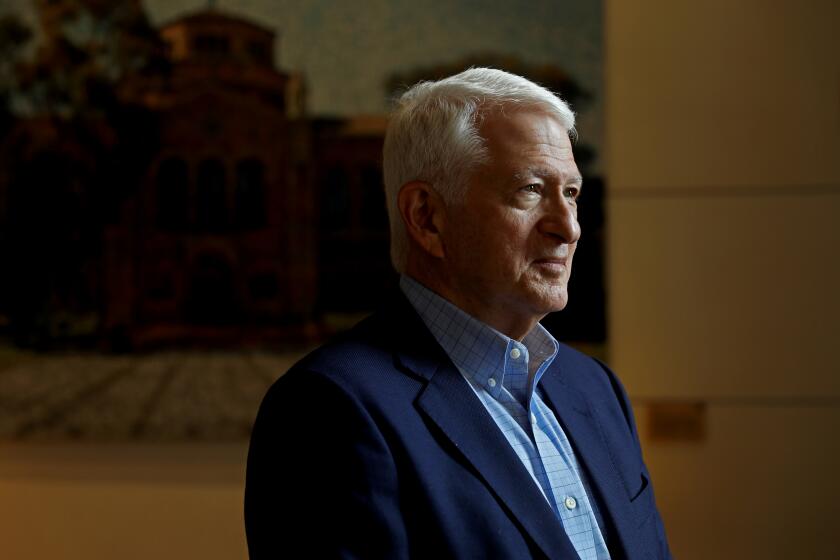Nursing Program Victim of Bottom Line : Education: The UCLA school is among the best in its field, but it faces major downsizing due to budget cuts. Faculty in the predominantly female school say they are victims of gender bias.
The issue, everyone agrees, has never been one of quality.
Indeed, during its nearly half-century of existence, UCLA’s School of Nursing has earned a national reputation for excellence, a judgment borne out by this year’s ranking of best universities and schools by U.S. News & World Report. The newsmagazine rated UCLA’s nursing program fifth-best in the nation.
Come next year, however, that reputation may change. As part of UCLA’s Professional Schools Restructuring Initiative, the School of Nursing is facing a substantial downsizing that includes the cutting of 13 faculty positions, the elimination of its baccalaureate program and the merging of the school’s administrative services with those of the School of Medicine.
Proposed in June by the university administration to alleviate mounting budget problems, the PSRI would cut $1.33 million from the School of Nursing’s $3.1-million operating budget.
Though the proposed cuts in nursing have been overshadowed by other controversial provisions of the PSRI--among them a call to eliminate the School of Public Health--nursing faculty and staff are no less enraged by their possible downsizing. The predominantly female school, they say, is being victimized by gender bias and a view that nursing is of secondary importance in the health care field.
“I think the administration does not value nursing as an academic profession. They see it more as a trade school,” said Mary Ann Lewis, a professor of nursing and the school’s faculty chair, who considers the action discriminatory.
Administration officials express regret over the proposed cuts but maintain they are necessary due to the university’s fiscal dilemmas. In October, Chancellor Charles E. Young’s office released a framework document detailing how the university would respond to state budget cuts totaling approximately $83 million. Included in the plans were $8 million in overall projected savings from the PSRI.
Executive Vice Chancellor Andrea Rich said the philosophy behind the PSRI is “to cut narrowly and deeply and not across the board.” As a result, a small number of schools--Social Welfare, Public Health, Architecture and Urban Planning, and Library and Information Science--are bearing the brunt of the PSRI cuts.
“We don’t have money anymore so we have to make choices,” Rich said. “We can’t do everything.” The choices, she said, were made more difficult in light of the quality of the various programs.
“UCLA doesn’t have low-ranked schools,” Rich said. “Anywhere we cut, we were going to cut something of quality.”
Administration officials cite the School of Nursing’s size--it has about 100 undergraduates and 250 graduate students--as affecting the decision to downsize the school. Placing nursing under the administrative purview of the School of Medicine, they say, would result in substantial savings.
“It’s a very, very small program,” said Vice Chancellor Michael Granfield, who contrasted it with the College of Letters and Sciences, which has 20,000 undergraduates. School of Nursing officials don’t deny they have a small student population as well as a high faculty-to-student ratio. In that respect, they say, their school is like the schools of edicine and dentistry, which offer similarly intensive curricula. “It’s true our school is small,” said Dean of Nursing Ada M. Lindsey. “But these are the people who go on to become the leaders in the field.”
UCLA’s proposal to eliminate the School of Nursing baccalaureate program also leaves the entire UC system without a bachelor’s degree program in nursing. Administration officials say they considered this in their decision to recommend eliminating the baccalaureate program. They maintain, however, that prospective nursing students may obtain bachelor’s degrees from more than two dozen Cal State system schools.
“We can do things at the graduate level that other schools can’t do,” Rich said. “The baccalaureate . . . can be picked up by other institutions.”
But School of Nursing officials say that given the growing popularity of nursing as a profession, state universities already have their hands full and are putting students on waiting lists. “The Cal State system can’t accommodate the demands of the numbers of students who want to enroll,” said nursing professor Lewis. Given the incipient national health care reform--in which nurses are expected to play a significant role--the downsizing of UCLA’s school could not have come at worse time, she said.
According to Dean Lindsey, California already lags behind other states in the percentage of nursing programs that offer bachelor’s degree and ranks 41st among the states in the ratio of registered nurses per 100,000 people.
The decision to eliminate the baccalaureate program is not yet final. The Academic Senate is reviewing the nursing program along with the other programs targeted by the PSRI proposals, and will issue its recommendation to the chancellor next year. In January, there will be a hearing to allow community comment regarding the university’s proposal.
But the fact the nursing program is undergoing such a review, say school officials, constitutes an insult in itself.
“They would never appoint an ad hoc committee to tell the schools of medicine, law or engineering what they should be teaching,” said Lewis, who noted the School of Nursing has survived three previous attempts to have parts of its program eliminated.
“It takes a lot of nerve and a lack of respect,” she said, “to tell us what we should be teaching.”
More to Read
Start your day right
Sign up for Essential California for news, features and recommendations from the L.A. Times and beyond in your inbox six days a week.
You may occasionally receive promotional content from the Los Angeles Times.






